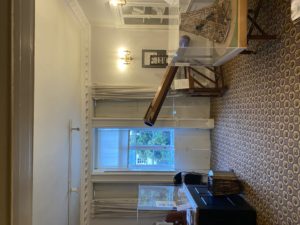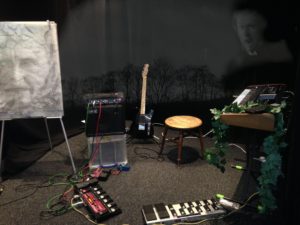I love walking. I like a good stroll. I like hiking, whatever a hike is. I like the ordnance survey app, although the most recent update has made it a little more annoying. And walking apps – I have a simple one, but some friends have watches that send info to their phones about heart rate, distance walked, incline, blood pressure, even sleep, maybe their dreams. One friend told me his app is like a psychoanalyst – in the morning the app says ‘last night you dreamt of making a city that looked like a huge pizza – click ‘more’ to see an interpretation, but before you do please watch this short advert from Dominoes.’
My walking app is simple, bog standard, dream analysis free. Bog standard which is apt because last week I walked through a bog. My walking app says I average 7 km a day. I walk and walk. Most of it up and down my kitchen as I wait for some package to be delivered. Or to the local Coop to buy some discounted salad. There are tens of thousands of footpaths across the UK, some rural communities have a spiders web of them, some crossing private gardens, others through fields full of curious cattle. Ah! The countryside, rolling hills, pastures, a shepherd watching over the flock, sparkling rivers. Harvest, all is safely gathered in. Winter, the snow drifts over the hillside, a lost sheep wanders through the white landscape. Spring, lambs gambolling in fields, and summer meadows, those summer meadows of yore, an explosion of wild flowers, butterflies, birdsong. This – of course – is all in the imagination, the nation’s imagination. The reality isn’t so good.
Something like 8% of England is accessible to the public. And that 8% is disappearing. But please note: every freedom of access we, in this country, have been granted, has been through an act of parliament passed by a Labour government. Land in Scotland and particularly, some Scandinavian countries are far more open. Try walking anywhere in the United States – you’ll probably end up shot. And, if your survive, you can then wonder why the USA is experiencing a growing obesity epidemic.
Because of cuts to local authority funding, footpaths have not been maintained. Some local authorities used to have footpaths officers, a job I once quite fancied. They are long gone. The right of way is still on the Ordnance Survey map, but the stile is overgrown with blackthorn. You cannot get through. Or there are bulls in a field. Here’s a statistic I want to drop in: 11% of Woking Local Authority’s land is devoted to golf. I could say more about golf. But that’s all for now. Who owns the land? And why do they own it? Why does anyone own anything? 36,000 landowners (0.06% of the population) own half of the rural land of England. And you can imagine, many of those landowners have inherited it through generations. Maybe from an ancestor who was a henchman of the King, a loyal sidekick prepared to slaughter some rebellious countryfolk. Or, indeed, their money came from slavery. But, hey ho, an Englishman’s home is his castle.
In the last fifty years the global populaton of farmed animals has tripled whle those in the wild have declined by two thirds. 96% of mammals worldwide are humans and farmed animals. Only 4% are wild. 70% of all birds are farmed poultry. And what is nature? How is anything natural? The hedgerows? The few trees left in the corner of a a farmyard? The acres of land devoted to fir plantations? Are we natural? Are computers and satellites natural? The English countryside is very different from the the landscape of Wales and Scotland – the Celtic nations are mountainous. The name of the most mountainous part of England, Cumbria, shares its etymology with Cymru, the Welsh word for Wales. Cymru, comrade, friend. The English word Wales, incidentally, comes from the Saxon for foreigner. The bloody cheek! The Anglo-Saxons, those invaders, swarmed across England, looked towards the mountains of what is now Wales and thought, well, that’s a dark ,impenetrable and hostile land. Let’s stick to these low pastures, this Saxon land, this Angle-Land. And let’s call them foreigners! Pastures of cattle graze this blessed plot, this England. The romantic poets, Wordsworth, particularly, Coleridge, how they banged on about the beauty of nature, as did the Romans and the Greeks, the pastoral poets, Virgil and Horace and the rest of them. They have fed into this myth of the countryside and by way of the public school curriculum and more recently the grammar and secondary school curriculum, many of us have been fed the same myth. It is there, in most of us, this myth of the countryside, of nature. Yes, there are still some areas that are protected – but those areas are declining, and now stand, according to a report back in 2024, at around 3%.(This came from the Wildlife and Countryside Link.) The English countryside is a factory. A livestock factory. So you can see fields of crops, remember this: half the calories produced by UK farmers go to feed livestock. And while we’re on the subject, 75% of the world’s soy is used to feed livestock. The destruction of the rain forest, the annihilation of species is for meat. Soy from Brazil feeds the hens that fill the chicken factories along the river Wye which, as I write, is the subject of the biggest environmental lawsuit ever – 4,000 people have signed up to a class action against poultry producers and water companies. 23 million chickens – a quarter of the UK’s poultry production, are raised in the river’s catchment area. I’ve used the word ‘raised’ – that’s not the right word for the way these birds are treated. They are not raised, they are industrially processed. 51% of UK land is inhabited by livestock. 51% of the UK is a factory for milk and meat. The English countryside, said JRR Tolkein has ‘good water, stones and elm trees and small quiet rivers’. Tolkein’s Lord of the Rings has fed into the myth, as have thousands of clones of his world.
I began this podcast after Brexit. I could feel myself becoming more and more unhappy about living in the UK. So I thought, no, I am going to celebrate what I love. Now look what’s happened. I’m berating the country again. I love it and I hate it, but I will not stand by and watch it destroyed. I think people are waking up to the degradation caused by intensive farming, by bird numbers plummeting because of lack of habitat. Last week I took a short walk to my local supermarket, the route follows a river. As well as the usual suspects – gulls, crows, pigeons, I saw egrets, herons, cormorants, wagtails and dippers. I see kingfishers, their blue splash of colour almost unworldly, and, as I like to tell anyone nearby, the Greek for kingfisher is halcyon. Halcyon days. So maybe, just maybe, just maybe….halcyon days will, one day, return.
Maybe.
(This is a transcription of the episode ‘The Countryside’ on my podcast ‘These Weird Isles’ – available on all platforms).

